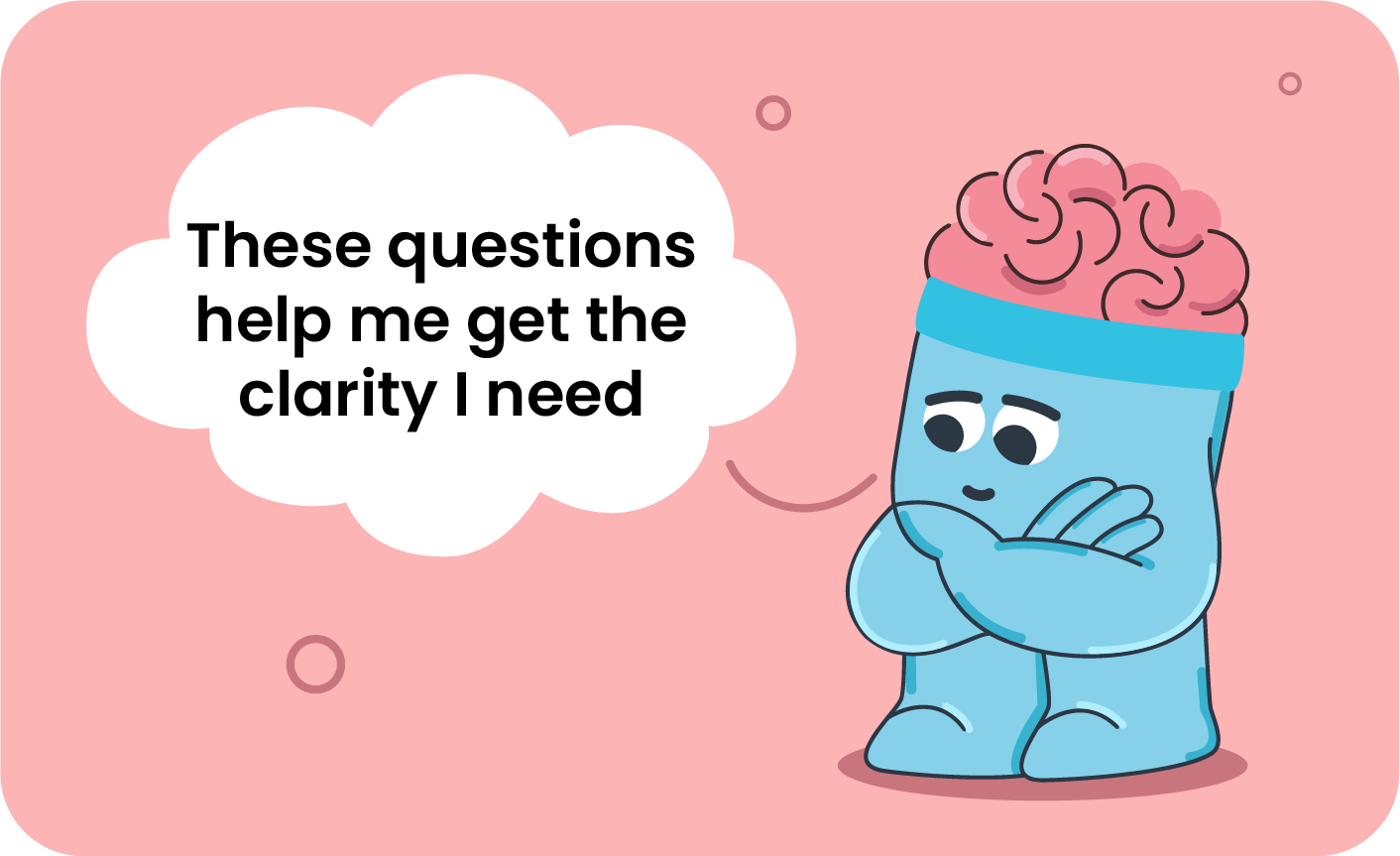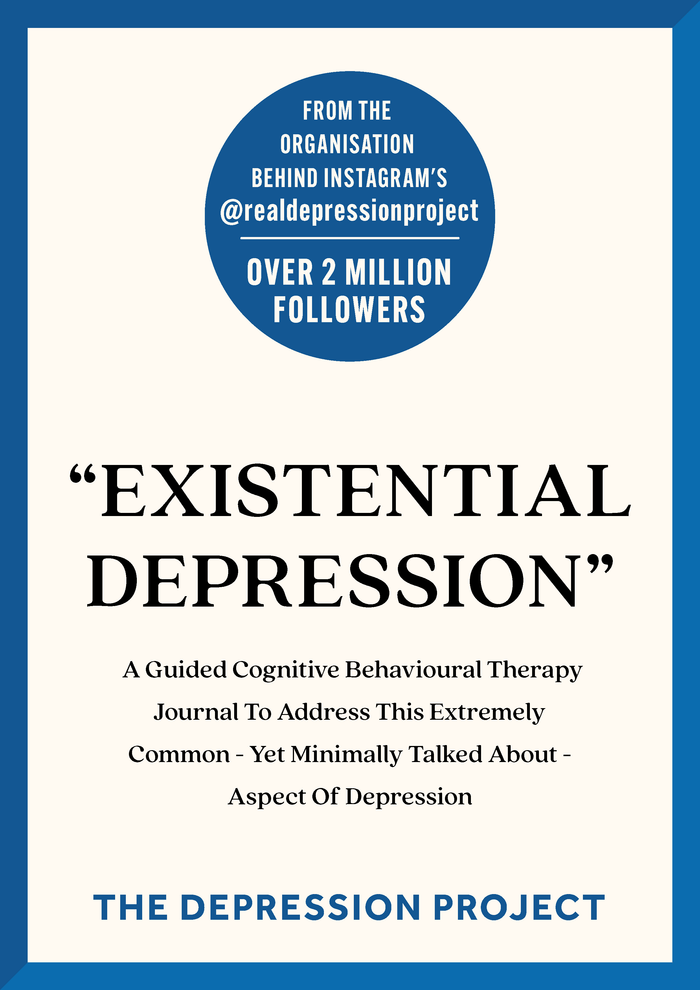According to members of The Depression Project's community, "what's the point of life?" is one of the most common thoughts that people with depression often think. And, if you can relate, then something that can be really worthwhile is Socratic questioning.
In case you don't know, Socratic questioning is a powerful technique used in cognitive behavioural therapy1 that involves asking open-ended, thought-provoking questions to encourage people to reflect on their thoughts, beliefs, and values2. In particular, Socratic questioning can be especially helpful for people grappling with existential thoughts like "what's the point of life?", as it can help them to:
- Develop a deeper understanding of their personal values and purpose in life;
- Challenge any unhelpful, negative thought patterns that may be fuelling the thought "what's the point of life?" and contributing to feelings of despair and/or hopelessness.
On that note, we'd now like to share with you six Socratic questions to help you achieve these objectives.
Are you ready?
Question #1 To Ask Yourself When You're Thinking "What's The Point Of Life?": What Are Some Things In Life That Bring Me Joy Or Fulfillment?
Joy and fulfilment are two core needs people have that can allow us to feel grounded and secure in our life. Consequently, by reflecting on this question, it can help you not only find more meaning and richness in your day-to-day life, but also provide some direction for things you may want to pursue in the future.
To help get you thinking, some common examples of things that may bring you joy and/or fulfillment could be, for example:
- Spending time with loved ones;
- Pursuing a hobby that you really enjoy;
- Your work;
- Volunteering;
- An exercise routine;
- Spending time in nature.
Question #2 To Ask Yourself When You're Thinking "What's The Point Of Life?": During The Times When I've Felt A Sense Of Meaning And Purpose, What Was I Doing?
By reflecting deeply on this question, it can help:
- Remind you of when you've felt the strongest sense of meaning and purpose in your life;
- Reveal what your core values are and what really matters to you.
Question #3 To Ask Yourself When You're Thinking "What's The Point Of Life?": How Can I Actively Create More Meaning And Purpose In My Life Through My Actions, Relationships, And/Or Personal Growth?
Asking yourself this question helps centre your focus on the present, and consider what you could do now in order to create more meaning and purpose in your life moving forwards. In practice, this may take the form of, for example:
- Prioritising spending more time with one or more people who matter to you;
- Altering your work-life balance;
- Making a point of scheduling in time to do something that's important to you, and/or learning a new skill that you've always wanted to learn;
- Organising a regular event around an interest you have, and reaching out to all your friends and family to see if they share your interest and would like to join.
- Joining a new group exercise class or sport that may not only get you in better shape, but also increase your chances to make new, meaningful connections with others.
Question #4: How Can I Reframe The Question "What's The Point Of Life?" In One Or More Practical, Healthier Ways?
"What's the point of life?" is inherently a very abstract, open-ended question that doesn't have a clear-cut answer. And, as a result, asking yourself this question can lead to rumination, overthinking, and feelings of powerlessness which can seem never-ending.
Consequently, it can be worthwhile reframing this question in one or more practical, healthier ways - such as by, for example:
- Making this question time specific - for example, by reframing it to "what is the point of life right now?"
- Making this question more personal to you - for example, by reframing it to "what is the point of my life?"
- Making this question more digestible / easier to answer - for example, by reframing it to "what is a point I can find in life?"
- Applying a context to this question - for example, by reframing it to "what is the point of my relationship with my partner?", "what is the point of my job?" or "what is the point of doing [insert activity]?"
Question #5 To Ask Yourself When You're Thinking "What's The Point Of Life?": Are There Any People Who Can Inspire Me To Engage With Life More Fully And Try New Things?
This is another question that can be really worthwhile reflecting on, because inspiration can be an extremely powerful motivator, and can encourage people to try new things, be open to new experiences, and pursue new goals - all of which can result in life being more rich, rewarding and meaningful. And, as you may be able to relate to, other people can often be a source of such inspiration. For example:
- A friend who always talks about their passion for politics may align with your political values, and consequently inspire you to get more involved in politics with them.
- A colleague who's passionate about playing golf on Saturday may inspire you to give it a go (which may lead to you developing your own interest and joy in the game).
- A teacher, mentor, role model or motivational speaker for example who you respect and look up to could also inspire you in a meaningful, purposeful way.
Question #6 To Ask Yourself When You're Thinking "What's The Point Of Life?": How Can I Contribute To The Well-Being Of Others And/Or Make A Positive Impact In The World Around Me?
One of the most fulfilling and meaningful things we can do in our lives is contribute to the well-being of other people, to a cause we care about, and/or to the world around us. For this reason, anything you can do to make a positive contribution to other people, society or the world at large - regardless of whether it's big or small - is likely to give your life an added sense of purpose.
Final Words
In order to gain clarity on the overarching question of "what's the point in life?", we really encourage you to dedicate the necessary time and space to deeply reflect on the Socratic questions that we've asked you in this blog post. Try not to rush this process, or to get frustrated with yourself if you can't come up with answers right away. Instead, we encourage you to:
- Be patient!
- Thoroughly explore and consider potential answers to the questions we've asked you;
- Hone in on answers that ignite your curiosity and passion.
If you take the time to do this, then it really can help you to find more meaning, purpose and fulfilment in your life.
All our love,
The Depression Project Team.
P.S. If you'd like more help dealing with the thought "what's the point of life?" - in addition to many other existential thoughts - then we think you'll find our "Existential Depression" journal extremely, extremely helpful.


